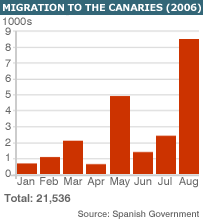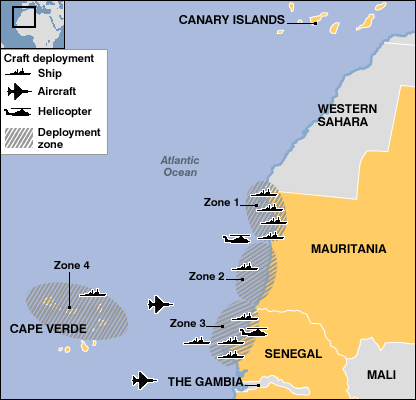
By Maarten den Heijer
Summer is on Europe’s doorstep and so is a new wave of migrants who will try to cross the Mediterranean and Atlantic in the coming months. Illegal immigration into Europe is in part a seasonal phenomenon. Due to increased border surveillance and border guard cooperation between Spain and Morocco, the traditional routes across the Strait of Gibraltar and to the Spanish enclaves in Morocco have now effectively been blocked. This has caused a diversion of migratory flows, through which migrants are increasingly forced to embark upon far longer and more perilous journeys.
 At present the predominant gateway to Spain are the Canary Islands. Most of the migrants set off from Mauritania or Senegal. This is a long journey indeed. Although many a migrant says he is willing to risk his life to enter Europe, the chances of survival are obviously highest during spring and summer. The verified death toll over 2006 of migrants attempting this crossing was 1,191, but the actual figure is likely to be much higher.
At present the predominant gateway to Spain are the Canary Islands. Most of the migrants set off from Mauritania or Senegal. This is a long journey indeed. Although many a migrant says he is willing to risk his life to enter Europe, the chances of survival are obviously highest during spring and summer. The verified death toll over 2006 of migrants attempting this crossing was 1,191, but the actual figure is likely to be much higher.
 Migrants don’t give up; neither do Spain and the European Union. Last week, the EU’s external border agency Frontex made public the results of operation Hera III, a sequel to last year’s operation Hera II, both targeted at border surveillance and interception of migrants in the territorial waters of Mauritania, Senegal and the Cape Verde. These operations, which Frontex says it will continue throughout this year, effectively amount to a naval blockade by which migrants are denied further passage to the Canary Islands. With the authorization and cooperation of Senegalese and Mauritanian authorities, any suspect vessel with migrants is intercepted and diverted back to African ports. Frontex’ Executive Director Mr Ilkka Laitinen said that in the last two months only 585 migrants arrived at the Canary Islands, with a total of 1167 migrants who were diverted back to ports at the West African coast. Clearly, in the view of the Frontex director, this is a success story. Not only from the perspective of preventing illegal migration, but also with a view to ‘contributing to the reduction of human lives lost at sea during the dangerous long journey’.
Migrants don’t give up; neither do Spain and the European Union. Last week, the EU’s external border agency Frontex made public the results of operation Hera III, a sequel to last year’s operation Hera II, both targeted at border surveillance and interception of migrants in the territorial waters of Mauritania, Senegal and the Cape Verde. These operations, which Frontex says it will continue throughout this year, effectively amount to a naval blockade by which migrants are denied further passage to the Canary Islands. With the authorization and cooperation of Senegalese and Mauritanian authorities, any suspect vessel with migrants is intercepted and diverted back to African ports. Frontex’ Executive Director Mr Ilkka Laitinen said that in the last two months only 585 migrants arrived at the Canary Islands, with a total of 1167 migrants who were diverted back to ports at the West African coast. Clearly, in the view of the Frontex director, this is a success story. Not only from the perspective of preventing illegal migration, but also with a view to ‘contributing to the reduction of human lives lost at sea during the dangerous long journey’.
It remains to be seen whether this interception program is a humanitarian success. The Achilles heel of this form of border control is that it does not distinguish between refugees and other migrants, potentially compromising internationally established refugee rights. The Austrian newspaper Der Standard reported that according to the Frontex director, this problem does not exist. When asked about the fate of refugees who might also be targeted by these kind of operations, mr. Laitinen responded: "Flüchtlinge?" "Das sind keine Flüchtlinge, sondern illegale Migranten." This response is highly typical of the current approach.
From a perspective of international and European law, a multitude of concerns about pre-border controls and interception can be raised. International refugee law dictates that all claims for asylum should be thoroughly examined. Pointing at a migrant in a vessel and saying ‘you are no refugee’ simply isn’t good enough. The Schengen border code furthermore stipulates that all persons refused entry at the EU’s external borders shall have the right to appeal. But since the actual interception is carried out by African authorities (who are well paid for this ‘service’ by Spain and the European Union), Frontex argues that the guarantees of this border code don’t apply. A strong case could also be made that these border controls are in conflict with the fundamental right that everyone shall be free to leave any country, including his own, as guaranteed by, among others, Article 12 of the International Covenant on Civil and Political Rights and Article 13 of the Universal Declaration of Human Rights.
Europe has only recently started developing common approaches in the struggle against illegal migration. In the past, Australia has devised its Pacific Solution by diverting all boat migrants to off-shore processing centres. The United States have had their Haitian Interdiction Program, through which boat people trying to cross the Florida Strait were returned to Guantanomo Bay. These precedents have raised serious refugee issues and attracted fierce academic and societal criticism. But at least these policies did acknowledge that account had to be taken of fundamental refugee rights and did include some kind of status determination procedure. It is a disgrace that Europe is now setting up its own interdiction program with as underlying assumption that no refugees try to reach Europe.
During the Cold War, European countries were unanimous in their condemnation of Soviet practices forbidding illegal emigration from Eastern Germany, arguing that everyone should have the right to seek asylum. But clearly, human rights are prone to political opportunism.
